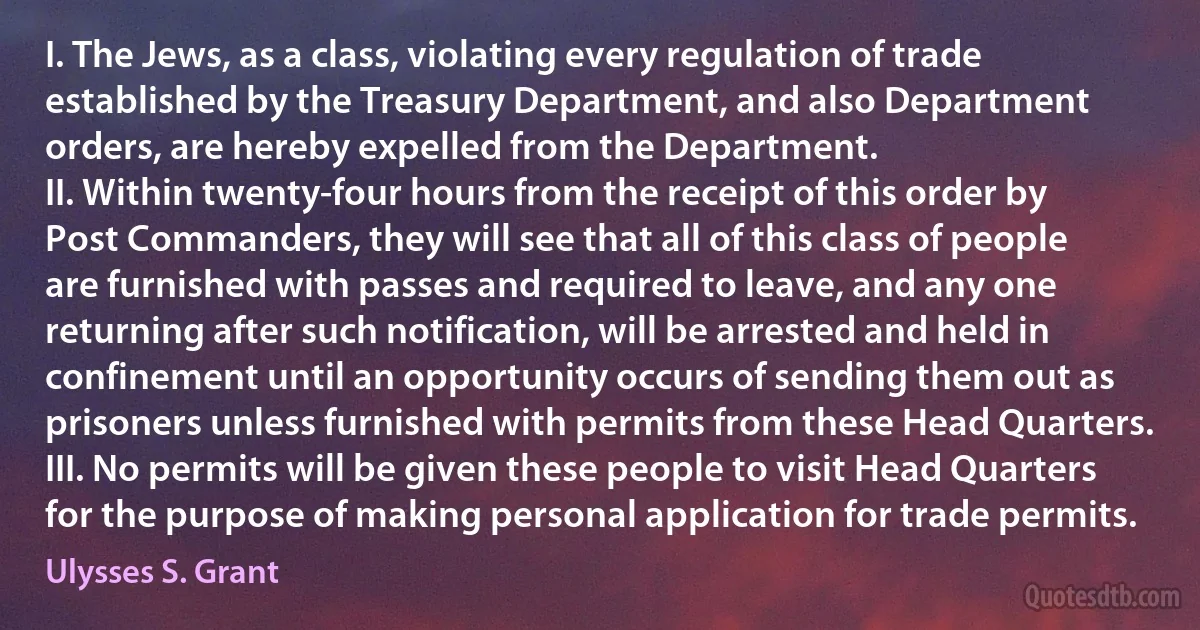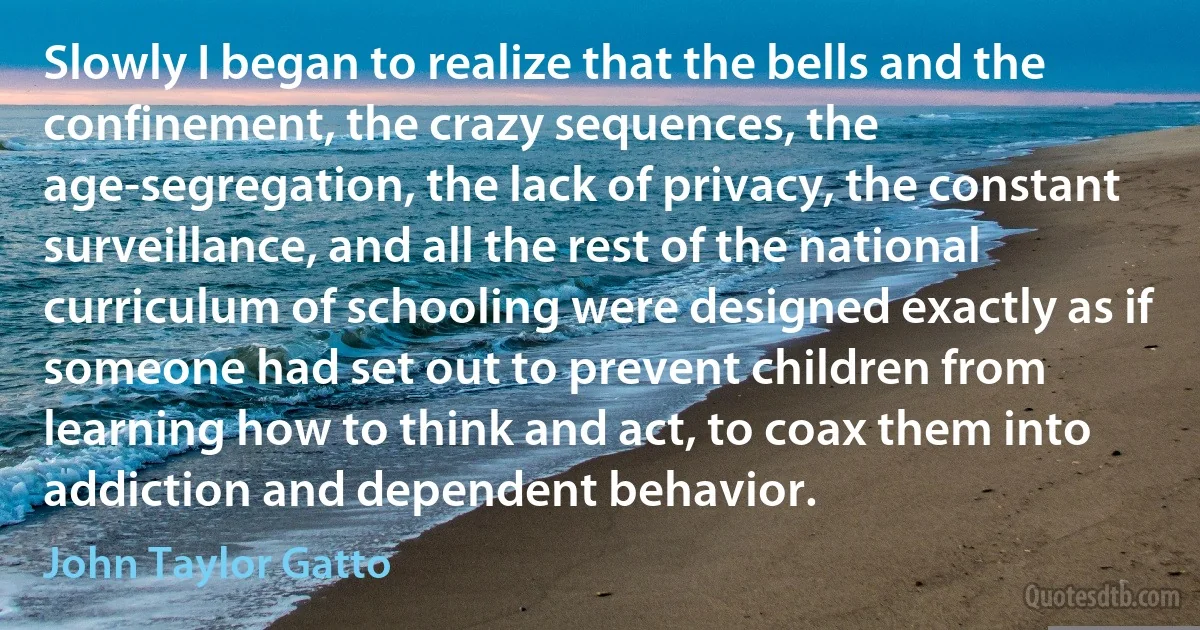Confinement Quotes - page 2
From the enemy's motions, I should be apt to suspect they were retreating from your army, or at least altering their operations. Mr. Lovell, who is at last enlarged from his confinement, reports that Colonel Allen, his fellow prisoner, was informed that transports were getting in readiness to sail, at a moment's warning, sufficient to transport fifteen thousand men.

Nathanael Greene
If peradventure, Reader, it has been thy lot to waste the golden years of thy life-thy shining youth-in the irksome confinement of an office; to have thy prison days prolonged through middle age down to decrepitude and silver hairs, without hope of release or respite; to have lived to forget that there are such things as holidays, or to remember them but as the prerogatives of childhood; then, and then only, will you be able to appreciate my deliverance.

Charles Lamb
But a punishment like forced labour or even imprisonment – mere loss of liberty – has never functioned without a certain additional element of punishment that certainly concerns the body itself: rationing of food, sexual deprivation, corporal punishment, solitary confinement ... There remains, therefore, a trace of ‘torture' in the modern mechanisms of criminal justice – a trace that has not been entirely overcome, but which is enveloped, increasingly, by the non-corporal nature of the penal system.

Michel Foucault
In the history of madness, two events signal this change with singular clarity: in 1657, the founding of the Hôpital Général, and the Great Confinement of the poor; and in 1794, the liberation of the mad in chains at Bicêtre. Between these two singular and symmetrical events, something happened, whose ambiguity has perplexed historians of medicine: blind repression in an absolutist regime, according to some, and, according to others, the progressive discovery, by science and philanthropy, of madness in its positive truth. In fact, beneath these reversible meanings, a structure was taking shape, which did not undo that ambiguity but was decisive for it. This structure explains the passage from the medieval and humanist experience of madness to the experience that is our own, which confines madness in mental illness.

Michel Foucault
In its most general form, confinement was explained, or at least justified, by a will to avoid scandal. It thereby signalled an important change in the consciousness of evil. The Renaissance had let unreason in all its forms come out into the light of day, as public exposure gave evil the chance to redeem itself and to serve as an exemplum.

Michel Foucault
Navigation brought man face to face with the uncertainty of destiny, where each is left to himself and every departure might always be the last. The madman on his crazy boat sets sail for the other world, and it is from the other world that he comes when he disembarks. This enforced navigation is both rigorous division and absolute Passage, serving to underline in real and imaginary terms the liminal situation of the mad in medieval society. It was a highly symbolic role, made clear by the mental geography involved, where the madman was confined at the gates of the cities. His exclusion was his confinement, and if he had no prison other than the threshold itself he was still detained at this place of passage. In a highly symbolic position he is placed on the inside of the outside, or vice versa. A posture that is still his today, if we admit that what was once the visible fortress of social order is now the castle of our own consciousness.

Michel Foucault
A prison taint was on everything there. The imprisoned air, the imprisoned light, the imprisoned damps, the imprisoned men, were all deteriorated by confinement. As the captive men were faded and haggard, so the iron was rusty, the stone was slimy, the wood was rotten, the air was faint, the light was dim. Like a well, like a vault, like a tomb, the prison had no knowledge of the brightness outside; and would have kept its polluted atmosphere intact, in one of the spice islands of the Indian Ocean.

Charles Dickens
The system here, is rigid, strict, and hopeless solitary confinement... I believe that very few men are capable of estimating the immense amount of torture and agony which this dreadful punishment, prolonged for years, inflicts upon the sufferers... I hold this slow and daily tampering with the mysteries of the brain, to be immeasurably worse than any torture of the body: and because its ghastly signs and tokens are not so palpable to the eye and sense of touch as scars upon the flesh; because its wounds are not upon the surface, and it extorts few cries that human ears can hear; therefore I the more denounce it, as a secret punishment which slumbering humanity is not roused up to stay.

Charles Dickens
With new technologies of surveillance, economies of scale overcome problems of cost. Since all their electronic communications can be accessed, it is no longer necessary to segregate the inmates from one another. As there is no outside world, escape becomes unimaginable. Technological progress has brought into being a system of surveillance more far-reaching than any Bentham could have conceived. Enclosing the entire population in a virtual Panopticon might seem the ultimate invasion of freedom. But universal confinement need not be experienced as a privation. If they know nothing else, most are likely to accept it as normal. If the technology through which surveillance operates also provides continuous entertainment, they may soon find any other way of living intolerable.

John N. Gray
The higher culture of the West-whose moral, aesthetic, and intellectual values industrial society still professes-was a pre-technological culture in a functional as well as chronological sense. Its validity was derived from the experience of a world which no longer exists and which cannot be recaptured because it is in a strict sense invalidated by technological society. Moreover, it remained to a large degree a feudal culture, even when the bourgeois period gave it some of its most lasting formulations. It was feudal not only because of its confinement to privileged minorities, not only because of its inherent romantic element (which will be discussed presently), but also because its authentic works expressed a conscious, methodical alienation from the entire sphere of business and industry, and from its calculable and profitable order.

Herbert Marcuse
In the most trying hours, through dismal nights and endless interrogations and maltreatment, during days of killing solitude in cells and close confinement, we were always sustained by the hope that all these agonies were not in vain, that there was a strong and mighty country, however far away, in which all the dreams for which we were fighting had been fulfilled. For us it was the homeland of the workers, in which labour was honoured, in which love, comradeship, and sincerity prevailed. With what joy I had felt the strength of that country as, emerging from prison in 1934, I listened in the dead of each night to Radio Moscow and heard the clock of the Kremlin tower striking the hours, and the stirring strains of the 'International.

Josip Broz Tito
If a human being is isolated from other humans for a month or more, and is confined to a small area geographically and a small range of activities, his interest in his surroundings and its minutiae increase radically.... Further, if a confined, isolated human is allowed brief contacts with other humans even without a shared language, he begins to find their presence comforting, and a pleasant relief from the "evenness" of his surroundings. If these humans controls his only sources of food as well as his sources of intraspecies stimulation, he mat adapt to their demands in subtle and not so subtle ways. He may, given time, learn their language, take on their beliefs, etc. When we catch a dolphin and put him alone in a small tank, we are imposing similar "solitary confinement" structures on him. Maybe we can thus capture his loyalty and his initiative.

John C. Lilly
Silence comes in two varieties: One that nourishes and comforts; another that chokes, smothers, and isolates. Solitary confinement is the worst kind of imprisonment we can inflict on fellow humans, and if you are forced to keep silent about some dark secret, you live in solitary confinement. Without the bridge of communication connecting you to other human beings, you can't share your burdens, can't receive comfort, can't confirm that you still belong. Silence is the abyss that separates you from hope.

Martha Beck
These people are buying Brazil in installments. This purchase in the past was also done by demarcating land. Brazil would only make deals overseas in exchange for forgoing its sovereignty, demarcating indigenous territories, expanding parks. It can't go on like this. You can't do anything in 61 percent of Brazil. In some places, if you want to produce, you can't, because you can't go on a straight line to export, or sell, you have to go on a huge curve to go around a quilombola community, an indigenous territory, an environmental reserve. They're ruining the country. As long as I am president, no indigenous land will be demarcated. They own 14 percent of the national territory. Imagine the Southeast-an area larger than that is indigenous. Isn't that enough? Yesterday, I was once again with a group of indigenous people, and they want freedom to work in their area; they don't want to live in confinement, like prehistoric beings.

Jair Bolsonaro
Many of the greatest composers and musicians do their best work in extreme confinement but we are seeing it in other fields - uses of technology to link people together in networks to solve problems and almost certainly we'll get better ideas than we would from them just doing it on their own.

Geoff Mulgan



